
18 AI Translation Tools Tested by Reddit Users: Here's What Actually Works for Full Books
Translating books with AI tools can save time and money, but which ones actually work? Reddit users tested 18 popular AI translation tools on full-length books, sharing insights on accuracy, formatting retention, and pricing. Here's what you need to know:
- Best Overall: BookTranslator.ai excels with EPUB files, offering high accuracy, formatting retention, and support for 99+ languages at $5.99–$9.99 per 100,000 words.
- Top for European Languages: DeepL provides context-aware translations but struggles with complex literary elements. Subscription starts at $8.74/month.
- Budget-Friendly: Google Translate is free but needs heavy editing for books.
- Best for Asian Languages: Papago performs well with Korean, Japanese, and Chinese but is limited in scope.
- Professional Tools: Trados Studio and MemoQ provide advanced features for large projects but come with higher costs and learning curves.
Quick Tip: Tools like BookTranslator.ai minimize post-editing by preserving formatting and context, making them ideal for full-book translations.
How I Translated a Book with AI (And Got a Bestseller)
Quick Comparison
| Tool | Strengths | Weaknesses | Language Support | Pricing (USD) |
|---|---|---|---|---|
| BookTranslator.ai | High accuracy, retains formatting | EPUB-only | 99+ languages | $5.99–$9.99 per 100,000 words |
| DeepL | Context-aware for European languages | Struggles with literary elements | Major languages | $8.74/month (Pro) |
| Google Translate | Free, widely accessible | Needs heavy editing | 130+ languages | Free or pay-as-you-go for docs |
| Papago | Strong with East Asian languages | Limited language range | Korean, Japanese, Chinese | Freemium |
| Trados Studio | Advanced features for professionals | Expensive, steeper learning curve | 70+ languages | $620+ (one-time or subscription) |
| MemoQ | Great for large projects | High upfront cost | 80+ languages | $47/month or $620 one-time |
For full-book translations, BookTranslator.ai stands out as the most efficient and affordable option, especially for EPUB files.
1. BookTranslator.ai
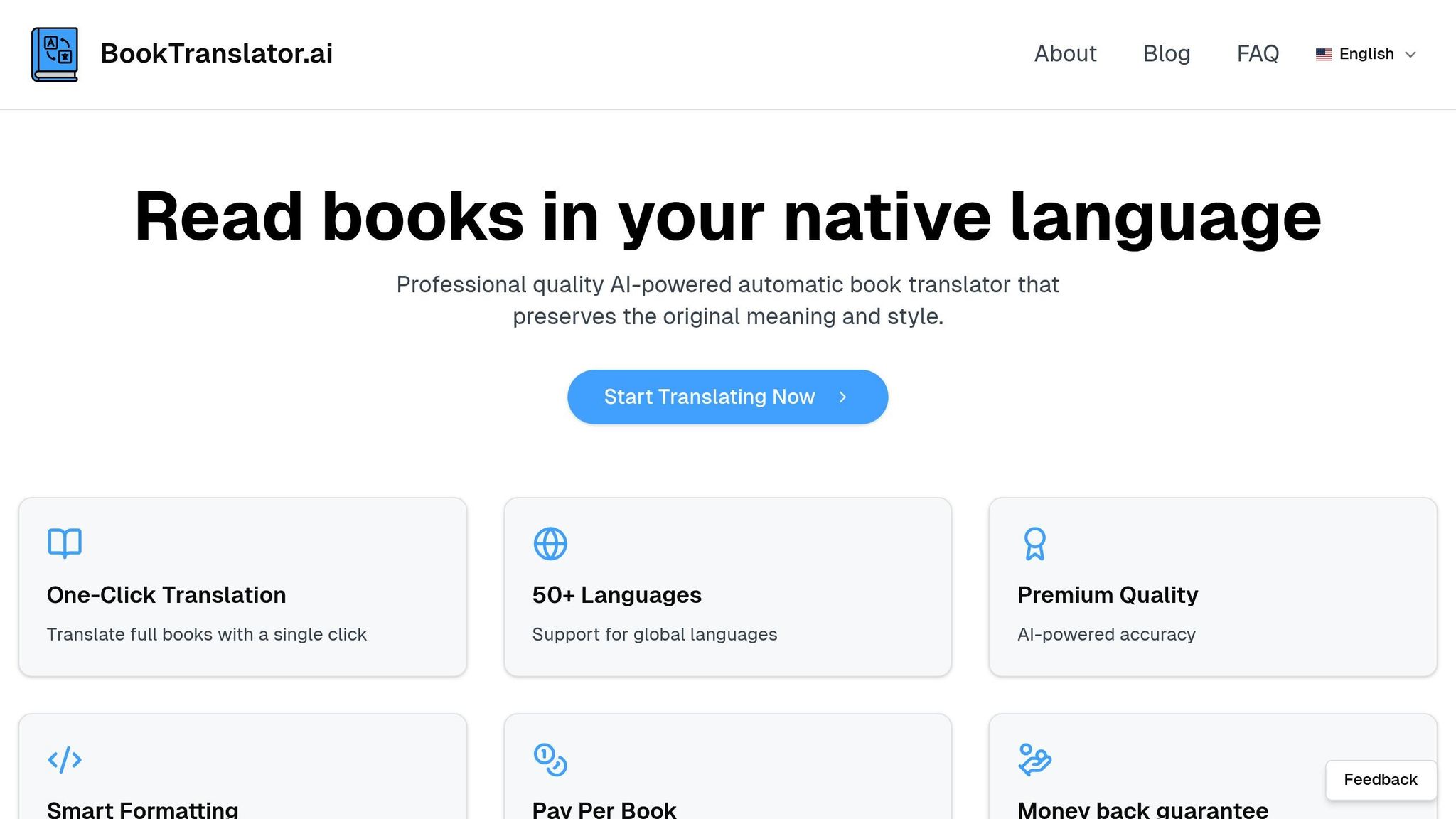
BookTranslator.ai has gained attention for its ability to handle full-book translations, with Reddit users frequently highlighting its strengths. Designed to translate EPUB books into over 99 languages, it’s a go-to tool for indie authors and publishers looking to broaden their reach.
Accuracy
The platform’s translation quality has been a standout feature among its users. For example, one Reddit user noted an impressive 95% accuracy when translating from English to Catalan, showcasing its reliability for diverse language pairs[1]. Powered by the Claude 3.5 AI model, BookTranslator.ai employs a sophisticated process to improve translation consistency. This process includes multiple passes, such as translation, iterative refinement, and glossary enforcement, ensuring polished results.
As ValPasch, a solo developer and indie publisher, explained:
"It runs each paragraph through multiple passes (translation → iterative refinement → glossary enforcement), preserving markdown formatting and improving output with each cycle."[2]
This recursive approach ensures consistency and quality, even for lengthy texts, making it a dependable option for book translations.
Formatting Retention
One of the platform’s key strengths is its ability to preserve the original formatting of books. From chapter structures to footnotes and even visual elements, BookTranslator.ai ensures that the translated version mirrors the original design[1]. Many users on Reddit have praised this feature, noting that the integrity of their work remains intact after translation.
Language Support
With support for over 99 languages, BookTranslator.ai covers a wide range of global and regional dialects. Users have successfully translated books into languages such as Korean, Japanese, German, Spanish, Catalan, and Swahili. This extensive language support makes the platform versatile for authors targeting diverse audiences.
Pricing (USD)
BookTranslator.ai offers a straightforward pay-per-book pricing model, which many users find convenient. There’s no need for subscriptions, and the pricing is as follows:
- Basic Plan: $5.99 per 100,000 words
- Pro Plan: $9.99 per 100,000 words
Both plans start at $5.99 per 100,000 words[1]. The Pro Plan utilizes the latest AI model for enhanced precision, while the Basic Plan provides reliable translations for most needs. The platform also offers a money-back guarantee and supports EPUB files up to 50MB, making it accessible for full-book translations.
2. DeepL
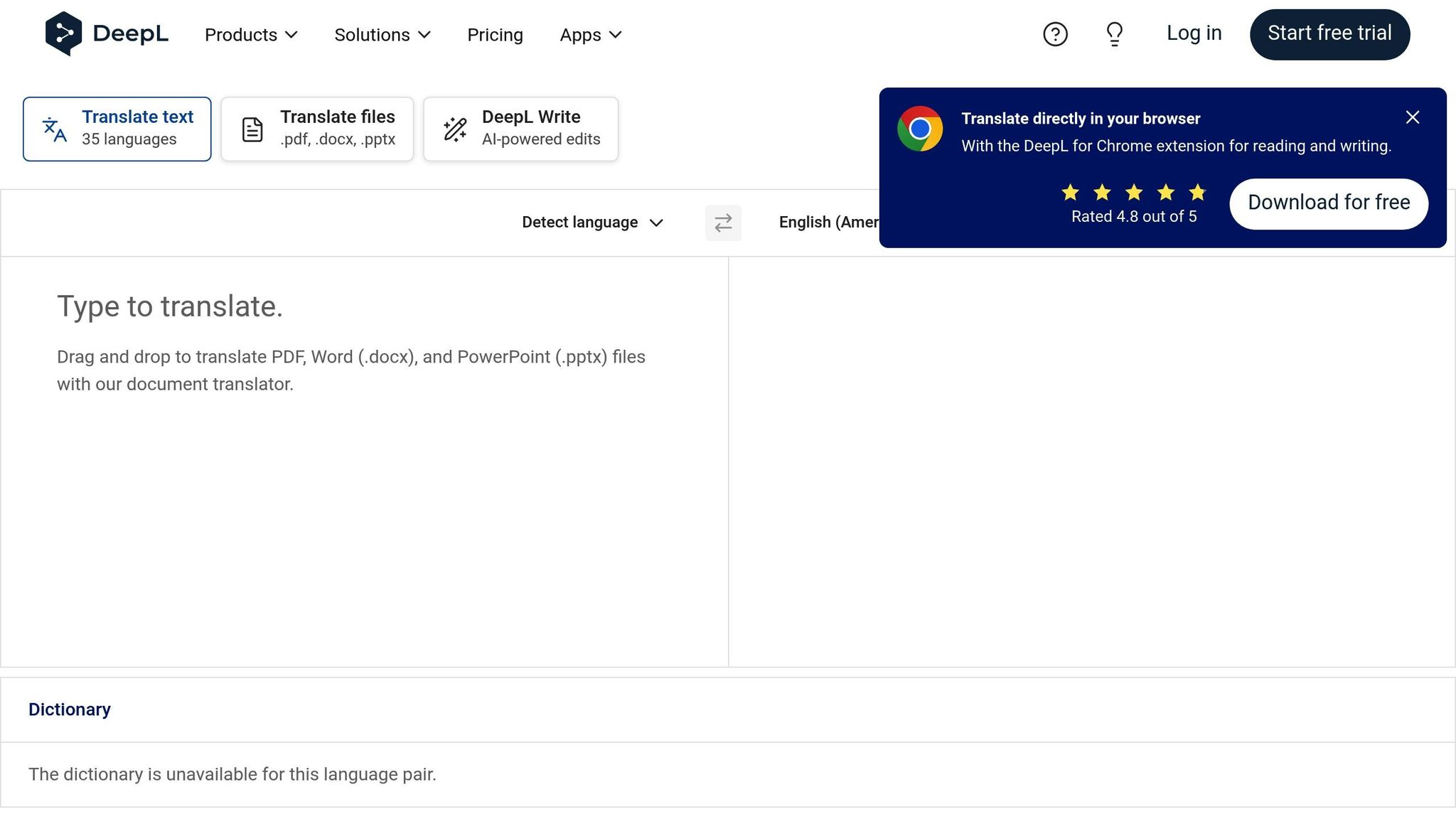
DeepL has earned a strong following among Reddit users, particularly for its ability to deliver accurate translations in European languages. Many book translators turn to DeepL for its knack for producing context-aware translations.
Accuracy
When it comes to standard content, DeepL consistently receives high marks from Reddit users. The platform shines in its ability to understand context and deliver natural-sounding translations that stay true to the original meaning. However, independent tests indicate that it can struggle with more complex book structures.
Lauren Smith, a USA Today bestselling romance author, shared her experience with the tool: “DeepL works well for basic content, but I avoid it for lengthy texts featuring pop culture references, historical language, or slang”[3]. This highlights DeepL's strength in handling straightforward prose, while also pointing out its limitations with the nuanced language often found in full-length books.
Formatting Retention
DeepL supports a variety of document types and aims to preserve the original formatting. This includes elements like line breaks, bullet points, and indentation. However, users have reported issues when dealing with extensive dialogue or complex structures.
Testing by independent authors has revealed some challenges, particularly with larger blocks of text. Formatting inconsistencies and occasional losses have been noted[3], which can be a significant hurdle when translating books where dialogue, chapter breaks, and narrative flow are critical.
Language Support
DeepL prioritizes quality over quantity in its language offerings. It excels in major European languages such as German, French, Spanish, Italian, Dutch, and Portuguese. The platform also supports several Asian languages, including Japanese, Chinese, and Korean, though the accuracy can vary depending on the complexity of the source material.
Pricing (USD)
DeepL uses a subscription model with tiered pricing:
- DeepL Free: Allows up to 500,000 characters per month.
- DeepL Pro: Starts at $8.74 per month for individual users.
- DeepL Pro Advanced: Costs $25.49 per month and includes additional features.
For translating entire books, most users will find the Pro version necessary due to the character limits. This makes DeepL a recurring expense rather than a one-time investment, which is worth considering when evaluating it against other tools. These insights provide a foundation for comparing DeepL with alternative options.
3. Google Translate
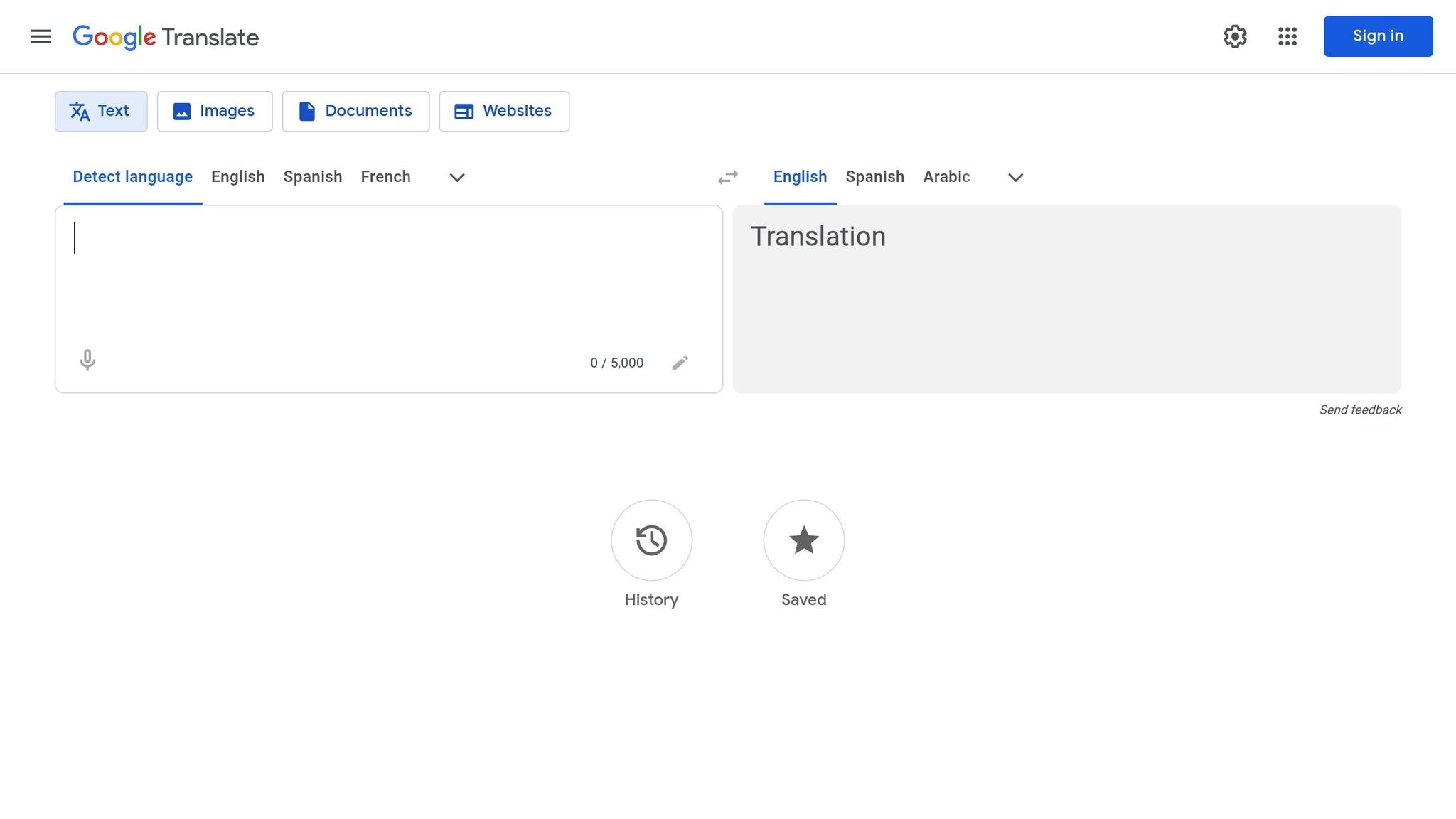
Google Translate is a well-known, free tool that often comes up in Reddit discussions about full-book translations. While it’s convenient and widely used, it does have some clear limitations.
Accuracy
Since 2016, Google Translate has made strides in understanding context and avoiding overly literal translations [6]. That said, its accuracy depends heavily on the language pair and the complexity of the text. For example, it performs exceptionally well when translating literary content into English, achieving over 90% accuracy with popular language pairs like Spanish and English [4][5].
A 2021 study by the UCLA Medical Center found that Google Translate preserved the overall meaning in 82.5% of translations. However, accuracy ranged widely, from 55% to 94%, depending on the language pair [4][5]. The tool struggles with idioms, slang, and cultural references, often translating them literally and losing the intended meaning [4][5][6].
"Google Translate can be helpful, but it's not accurate enough for professional or business use without human review. It can reach 80% to 90% accuracy between popular language pairs, but complex sentences and cultural contexts still require manual proofreading." – WuMike, Timekettle [5]
Another challenge lies in formatting. While the tool can handle basic translations well, it doesn’t always maintain the original layout or structure of the content.
Formatting Retention
For those looking to preserve formatting, Google Translate offers a Document Translation feature through Cloud Translation – Advanced. This feature supports file types like PDF and DOCX and is designed to maintain the original layout during translation [7]. However, the quality of formatting retention can vary depending on the complexity of the document.
Language Support
Google Translate supports over 130 languages [4], making it one of the most extensive translation tools available. But its accuracy isn’t consistent across all languages. Translations between major European languages tend to perform well, while low-resource languages like Cebuano, Georgian, Kurdish, and Nepali can have error rates as high as 80% [5]. For technical texts, accuracy is around 85%, thanks to regular updates [6]. However, literary content often falls short of this benchmark.
Pricing (USD)
Standard text translations with Google Translate are free [4]. For the Document Translation feature, pricing falls under Google Cloud’s pay-as-you-go model and is based on document size and usage.
"Google Translate is capable of many wonderful functions, but it shines best when working with other translation tools and human editors." – Rayne Aguilar, Weglot [4]
Reddit users frequently suggest using Google Translate as a starting point for book translation. To achieve professional results, they recommend combining it with human editing and additional translation tools. This approach helps address its limitations while leveraging its strengths.
4. Microsoft Translator
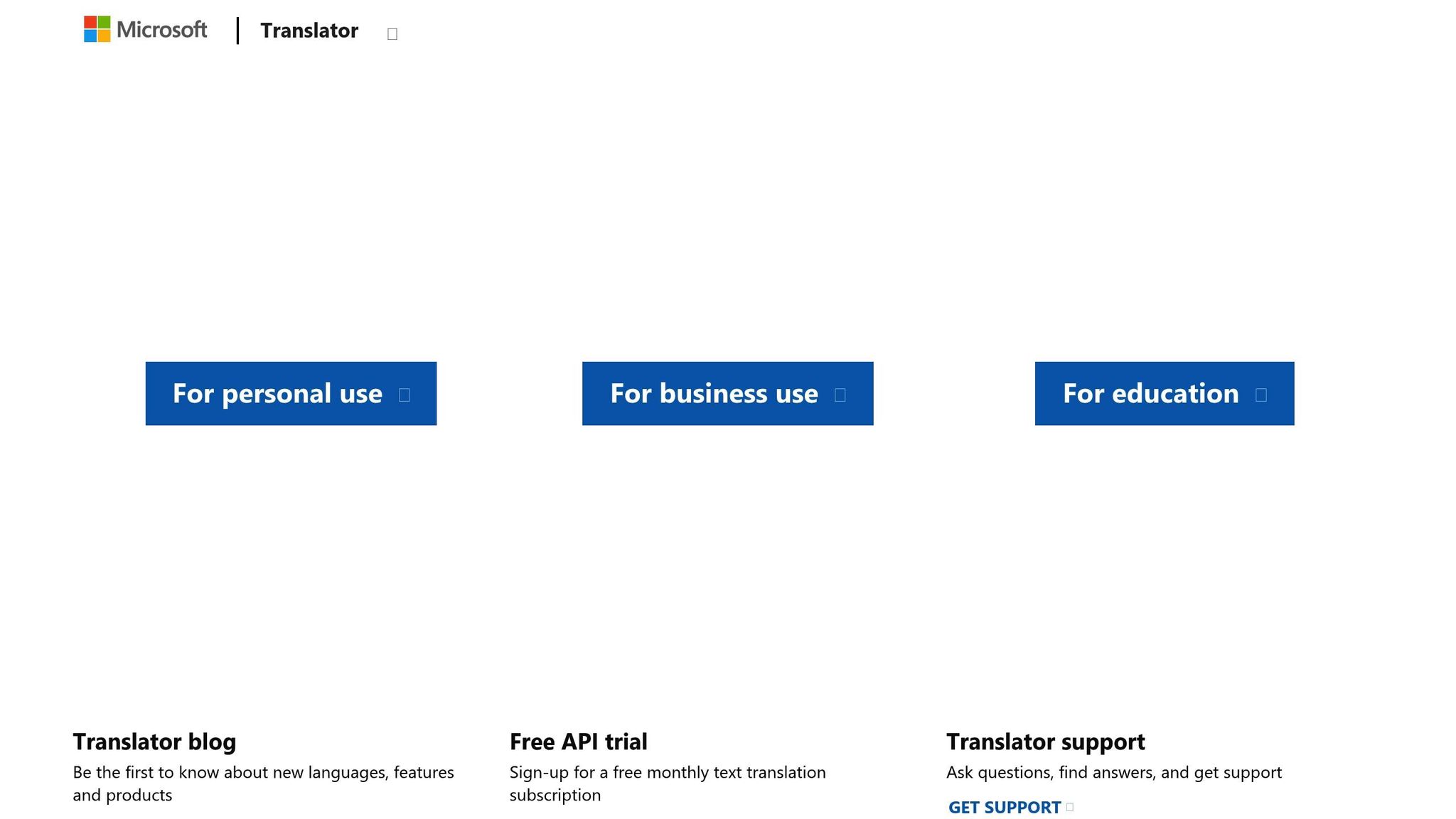
Microsoft Translator has earned a solid reputation among Reddit users for translating full-length books, particularly when it comes to technical and formal content. Its consistency and reliability make it a popular choice for these types of projects.
Accuracy
Microsoft Translator leverages neural machine translation to deliver reliable results, especially for technical and formal texts. According to Reddit users, it maintains a high level of accuracy across lengthy documents, ensuring consistency throughout. This makes it a strong option for translating non-fiction books, academic materials, or any content with a more structured writing style.
The tool shines when dealing with formal language and specialized terminology. However, like many AI translation tools, it struggles with creative language, idioms, and subtle cultural nuances often found in literary works. Its focus on precision and technical accuracy sometimes comes at the expense of the vibrancy needed for more artistic texts. That said, its conservative approach helps minimize errors, which is critical for technical translations.
Formatting Retention
One standout feature of Microsoft Translator is its ability to retain document formatting during translation. It works seamlessly with Microsoft Office files, such as Word documents and PowerPoint presentations, preserving essential elements like headers, paragraph breaks, and text styles. This is especially helpful for books that include tables or specific layout designs.
While the tool handles most formatting well, users on Reddit have pointed out that more complex layouts might need some manual tweaking after translation. Still, its ability to handle standard formatting elements effectively makes it a convenient choice for document-heavy projects.
Language Support
With support for over 70 languages, Microsoft Translator performs best with widely spoken options like Spanish, French, German, and Chinese. These languages benefit from larger training datasets, which result in more reliable translations.
However, the quality can vary depending on the language pair. Translations between English and major European languages are typically more dependable, while less common language combinations may yield inconsistent results. Reddit users suggest testing your specific language pair before diving into a full book translation to ensure the output meets your expectations.
Pricing (USD)
Microsoft Translator offers competitive pricing alongside its robust performance. The free tier, which includes up to 2 million characters per month, is generous enough to cover the translation of several average-length books. For users with higher volume needs, paid plans start at $10 per million characters through Azure Cognitive Services.
Both the free and paid plans include the document translation feature, making it accessible for individual users and small-scale publishing projects. Larger enterprises can benefit from additional features and higher usage limits through Microsoft's cloud services. Plus, its integration with Microsoft Office ensures a smooth workflow without requiring users to learn new tools or interfaces.
5. Amazon Translate
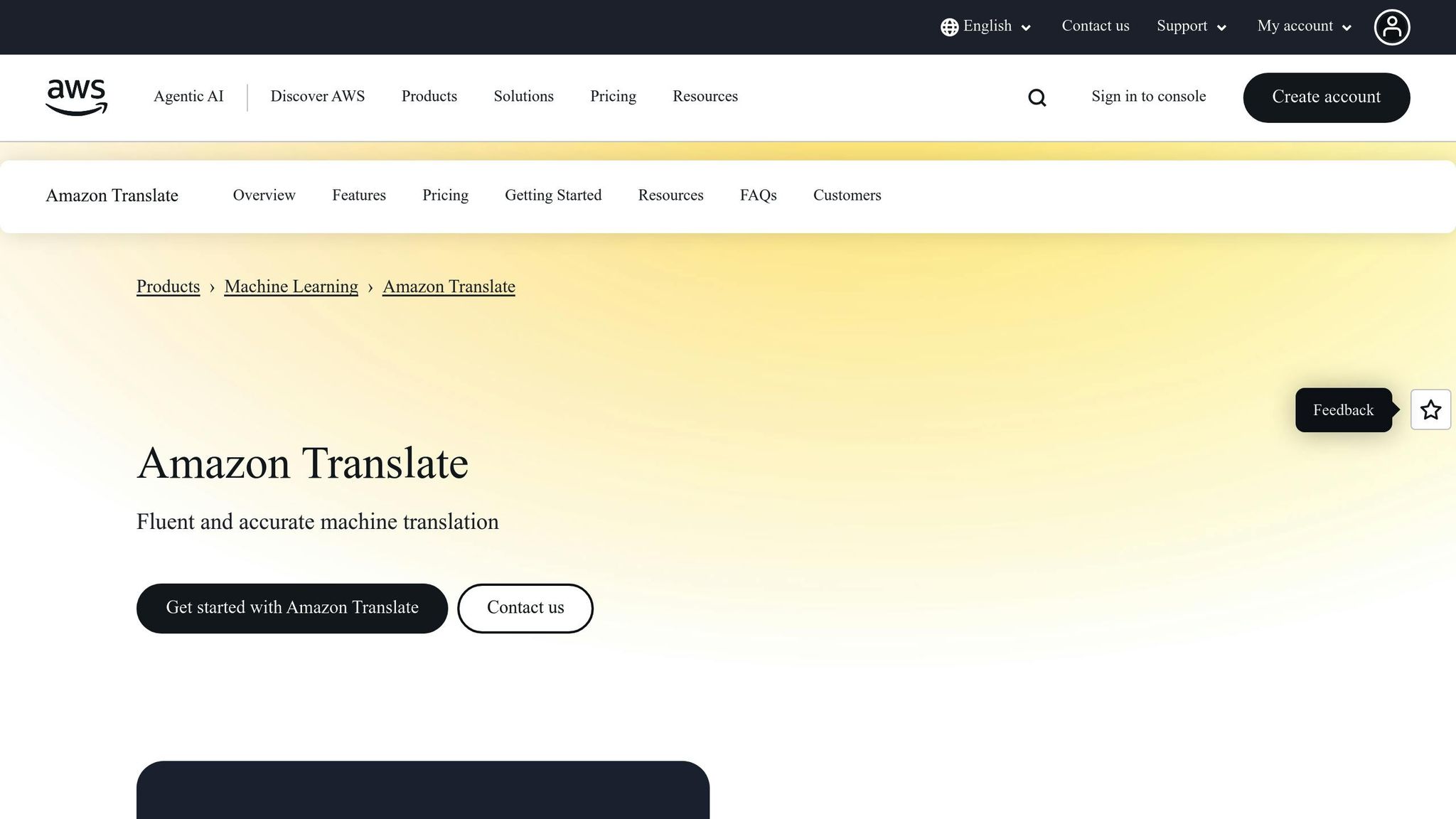
Amazon Translate is frequently highlighted by Reddit users for its ability to scale and its seamless integration with Amazon Web Services (AWS). This makes it a practical choice for larger book translation projects, though it may lack some advanced features that individual users might prefer.
Accuracy
When it comes to straightforward texts - like factual content, instructions, or non-fiction - Amazon Translate delivers solid results. However, it tends to struggle with more nuanced language, such as idioms, cultural references, or intricate dialogue. For these more complex elements, post-editing is often necessary to ensure the translation feels natural and accurate.
The tool performs best when translating between English and widely spoken European languages like Spanish, French, and German. That said, accuracy can dip when dealing with less common language pairs or highly specialized terms, which may require additional human intervention.
Language Support
Amazon Translate supports over 75 languages, covering many of the world’s major markets. It excels in handling high-resource languages, particularly in translations involving English, Spanish, French, German, Portuguese, and Chinese. However, users have pointed out that the quality can vary depending on the language pair. For instance, translations involving Japanese, Korean, or Arabic often need extra refinement. For book-length projects, it’s wise to test the service on sample chapters before committing to a full manuscript translation.
Pricing (USD)
Amazon Translate charges $15 per million characters, with no monthly minimums or upfront fees. For a typical 300-page novel containing around 500,000 to 750,000 characters, the cost would range from $7.50 to $11.25 per book.
New AWS users can take advantage of 2 million free characters during their first 12 months. This is enough to translate multiple smaller books or experiment with the service before committing to larger projects. The straightforward pricing structure makes Amazon Translate an appealing option for high-volume publishers looking to manage costs effectively.
6. iTranslate
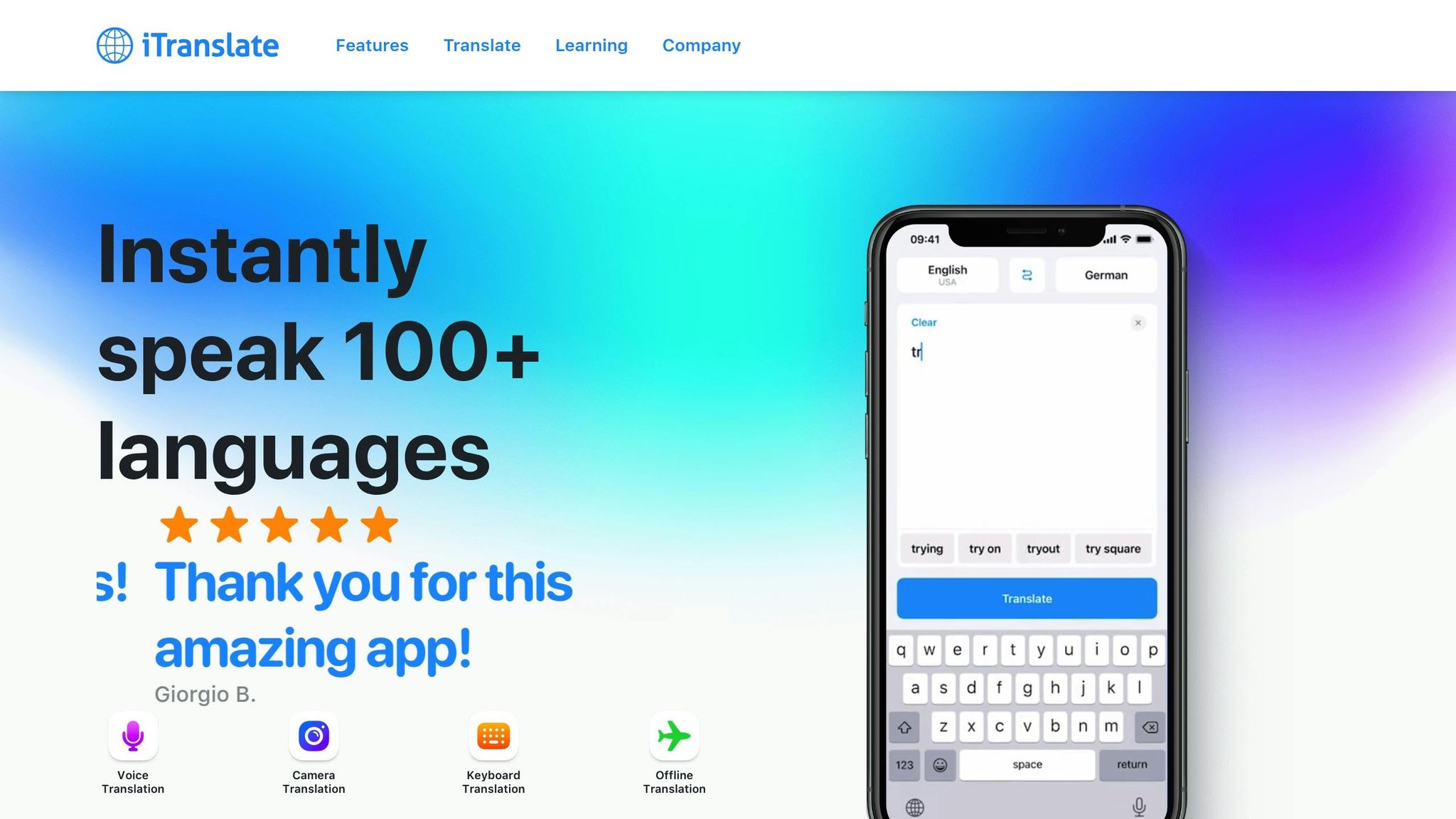
iTranslate has earned a reputation on Reddit as a go-to app for quick, mobile translations. However, when it comes to translating entire books, it falls short. While the app is great for conversational phrases and short texts, it struggles to handle the complexity and nuance of longer literary projects.
Accuracy
Many Reddit users point out that iTranslate does well with simple sentences but struggles to maintain a cohesive narrative in larger works. The app translates sentences individually, often resulting in a choppy and disjointed flow that disrupts the story's rhythm.
Literary elements like metaphors, symbolism, and consistent character voices are particularly challenging for iTranslate. One user shared their experience translating a mystery novel from English to Spanish, noting that the app completely failed to preserve the author's unique style. The translated chapters felt like they were written by entirely different people, which detracted from the reading experience.
Accuracy also takes a hit when dealing with technical or specialized content. Academic texts, technical manuals, and industry-specific works often require extensive corrections to fix mistranslations and restore proper context. These issues are consistent across various language pairs.
Language Support
iTranslate offers support for over 100 languages, but the quality of translations varies widely depending on the language pair. For example, the app performs best with major European languages such as Spanish, French, German, and Italian when paired with English.
However, users often encounter significant issues with Asian languages like Chinese, Japanese, and Korean. The app struggles with cultural subtleties and complex grammar, making it less reliable for book translations in these languages. Many Reddit users suggest using iTranslate as a starting point for Asian language projects, followed by extensive human editing.
For less common language pairs, the results can be even less reliable. Users attempting translations between languages like Finnish and Portuguese or Arabic and Dutch often find the output so inconsistent that it’s easier to start from scratch with a human translator. These challenges highlight the app's limitations for more specialized projects.
Pricing (USD)
iTranslate uses a subscription-based pricing model rather than charging per use. The Pro version costs $4.99 per month or $39.99 annually, offering unlimited text translations and offline functionality.
While this subscription model may seem affordable, the time required for editing often offsets the savings. Reddit users frequently note that the post-editing workload is so significant that the lower subscription cost doesn’t necessarily make up for it.
The free version of iTranslate limits users to 5,000 characters per day, which is impractical for translating full books. For most book projects, the Pro subscription becomes essential. However, many users cancel their subscriptions after finishing their projects, citing the ongoing monthly fee as unnecessary once their work is complete.
7. TranslatePress
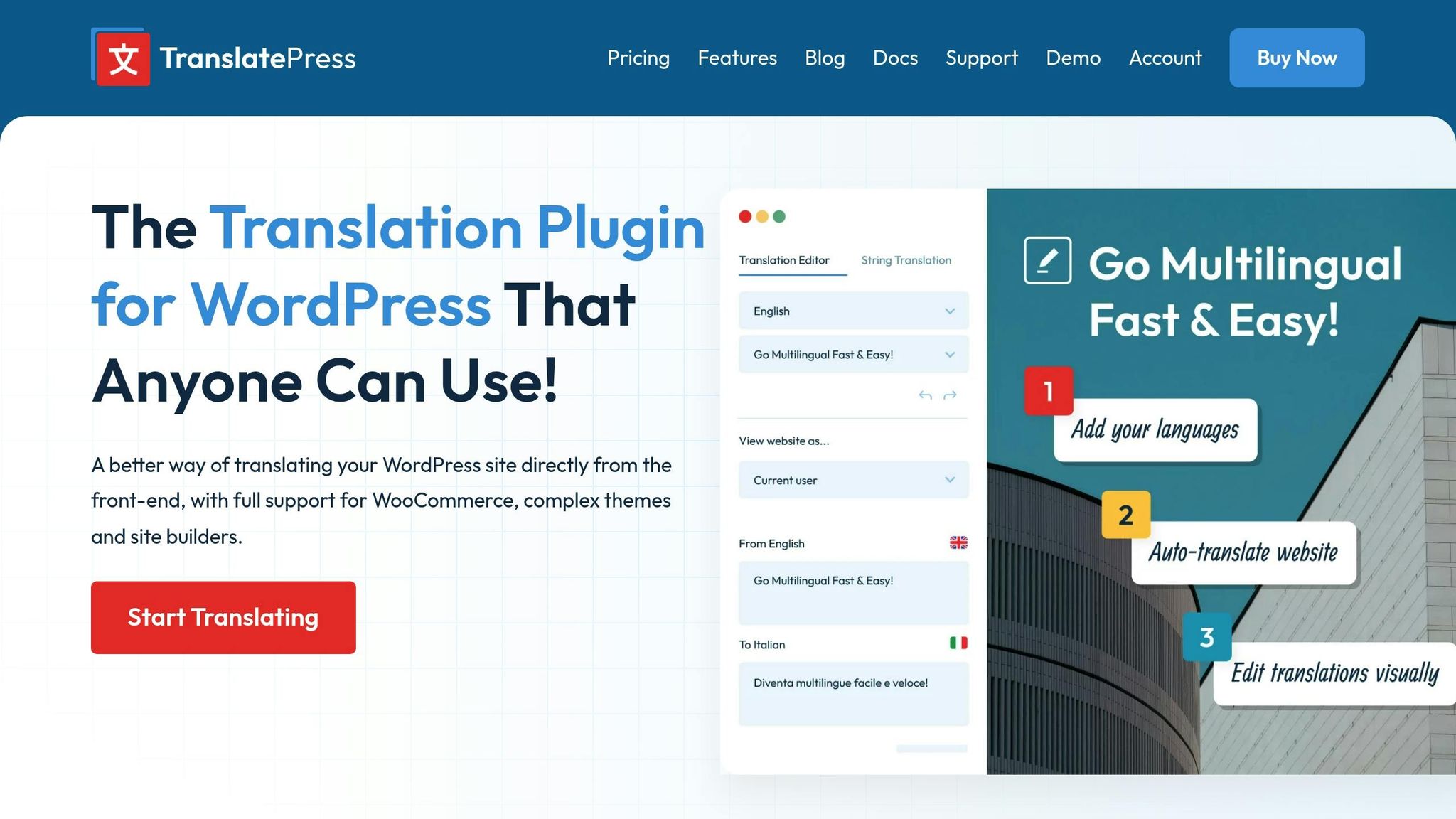
TranslatePress stands out as a WordPress plugin designed to handle website translations, especially for sites with intricate layouts. Unlike tools focused on translating books or documents, TranslatePress uses a live, visual interface that lets users translate their entire website directly from a live preview. This approach is particularly helpful for maintaining complex formatting and ensuring the translated version mirrors the original design.
Accuracy
TranslatePress taps into translation engines like Google Translate and DeepL for its functionality. The accuracy of the translations depends on the engine you choose. With its live visual interface, users can spot potential context issues in real-time, making it easier to refine the output. However, for the best results, a human review is often needed to polish the final translation.
Formatting Retention
One of TranslatePress's standout features is its ability to preserve complex website layouts during translation. It keeps the original structure intact while showing a live preview of how the translated content fits into the design. This includes handling elements like shortcodes, forms, and components created with page builders, ensuring the interactive elements of the site remain functional and visually consistent.
Language Support
The plugin supports 132 languages in its free version, with premium options extending this to 221 languages. Premium users can also create unlimited language combinations. Additionally, it supports custom languages and right-to-left (RTL) scripts like Arabic and Hebrew. Since it integrates with Google Translate and DeepL, the quality of translations will vary depending on the language pair and the engine you choose to use.
8. Smartcat
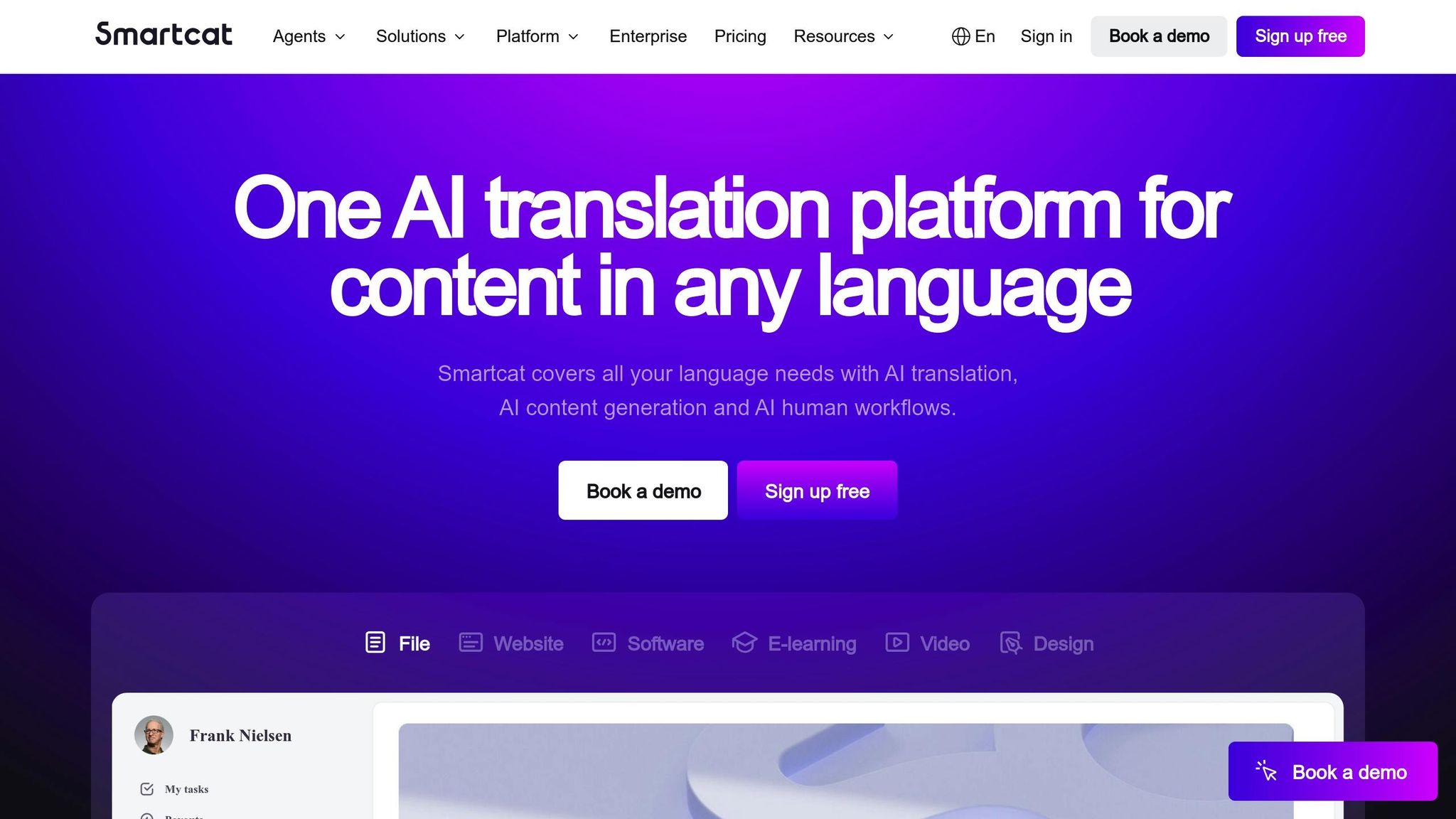
Smartcat is a cloud-based platform designed to streamline book translations by blending AI-driven tools with human expertise. It breaks down lengthy texts into manageable segments, ensuring consistency across the entire project. One standout feature is its collaborative setup, which allows multiple translators to work simultaneously on different sections. Additionally, Smartcat uses translation memory technology to store and suggest previously approved segments, saving time and maintaining uniformity.
Accuracy
Smartcat employs a hybrid method for translations. It begins with neural machine translation, which is then refined by professional translators through post-editing. For widely used language pairs like English to Spanish or French, the initial AI output often serves as a solid base, requiring only moderate adjustments. However, for complex literary works or less common language pairs, human translators play a larger role to ensure the author's tone and cultural nuances are preserved. The platform’s translation memory further enhances accuracy by suggesting prior translations for recurring phrases, ensuring consistency throughout the text.
Formatting Retention
Smartcat excels at maintaining the original structure of documents during translation. With advanced file processing, it supports popular publishing formats like DOCX, PDF, and various e-book formats, preserving critical elements such as headers, footnotes, italics, and other basic styling. By segmenting the text for translation while keeping the layout intact in the background, the platform allows translators to focus solely on the content. For projects with intricate formatting - like custom styles or embedded images with text - an additional review may be necessary. Smartcat’s preview modes make it easier to spot and fix any layout issues before final delivery.
Language Support
Smartcat supports an extensive range of language pairs, covering major world languages and numerous regional dialects. This makes it a great choice for publishers aiming to reach global audiences. While translation quality tends to be higher for languages with abundant training data and native-speaking translators, the platform also connects users with skilled human translators for less common languages, ensuring quality translations regardless of the target language.
Pricing (USD)
Smartcat operates on a freemium model. Individual translators can access essential features like translation memory and AI tools for free under the basic plan. For those needing advanced functionalities or project management tools, Smartcat offers scalable pricing options based on usage, project size, and complexity. For larger book translation projects, users can request custom quotes tailored to their specific needs.
9. Crowdin

Crowdin is a platform that brings together authors, publishers, and volunteer translators to collaborate on large-scale translation projects. It’s particularly popular for community-driven efforts, where multiple contributors work collectively on translating extensive texts. For instance, Reddit users highlighted its role in translating "the Rust Book" into Ukrainian [8].
Accuracy
With volunteer translators at the helm, the quality of translations on Crowdin can vary depending on contributors' expertise and availability. While the platform has been utilized for translating technical documentation and even entire books, detailed evaluations of its accuracy for longer texts are still somewhat limited. Beyond just translating the words, ensuring that the original document's structure and format remain intact is equally important.
Formatting Retention
Crowdin supports over 100 localization file formats, including DOC, PPT, RTF, and PDF [11]. To maintain document structure, it automatically converts PDFs into DOCX files, preserving elements like headers and paragraphs.
Language Support
The platform offers support for hundreds of languages, including rare ones like Acholi, Arpitan, Cherokee, and even Klingon [9]. If needed, users can also add custom languages [10], making it a flexible choice for publishers aiming to reach niche audiences. This wide range of language options pairs well with its accessible pricing.
Pricing (USD)
Crowdin follows a freemium model, providing a basic plan at no cost [8].
sbb-itb-0c0385d
10. SYSTRAN
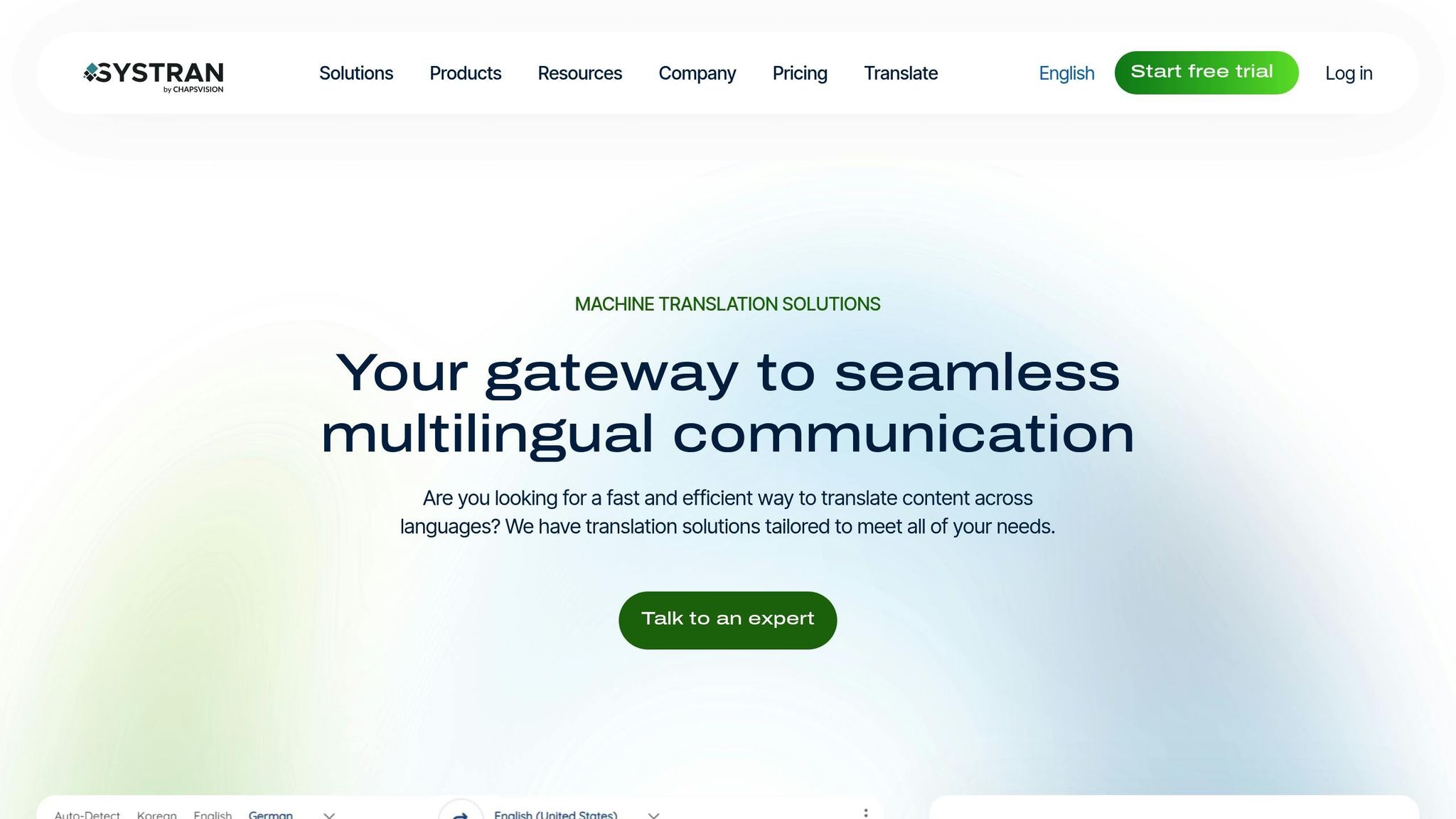
SYSTRAN has been a longstanding player in the machine translation field, offering both cloud-based and on-premise solutions for document translation. Reddit users have experimented with this tool to translate full-length books, noting that it handles clean, well-formatted text effectively but struggles with content extracted from low-quality images.
Accuracy
SYSTRAN delivers reliable translations for well-structured text. However, it can falter when dealing with poorly scanned or low-quality images. One of its standout features is the ability to customize translations using "User Dictionaries", which allow users to define specific terminology and address nuances like word morphology and homography [14][16]. This customization adds an extra layer of precision to its document-handling capabilities.
Formatting Retention
The platform supports a variety of document formats, such as Office files (DOCX, XLSX, PPTX), PDF, XML, and IDML [12], with a focus on retaining layouts during translation. However, its performance in maintaining formatting can be inconsistent. Freddy Muriuki from TranslatePress.com shared his experience:
"When you translate any of the document formats (be it docx, images, PDF, etc.), SYSTRAN keeps your file layouts. I tried it, and some final layouts were inconsistent. But it's expected of machine translation" [13].
Language Support
SYSTRAN offers broad language coverage and includes automatic source language detection, making it versatile for various translation needs. Ricardo O., an External Platforms Specialist in E-Learning, highlighted its convenience:
"The software allows you to effortlessly translate whole documents in all major formats, detecting automatically the source language" [14][15].
Pricing (USD)
SYSTRAN caters to both cloud-based and on-premise needs with its SYSTRAN Translate PRO and SYSTRAN Server options. While Reddit users didn’t provide specific pricing details, the platform’s focus on enterprise customers is evident through features like MS Office plugins. Allen G., a teacher in Education Management, remarked:
"Use their MS Office Plugins in google chrome and save a lot of time translating PDF documents" [14][15].
11. MateCat
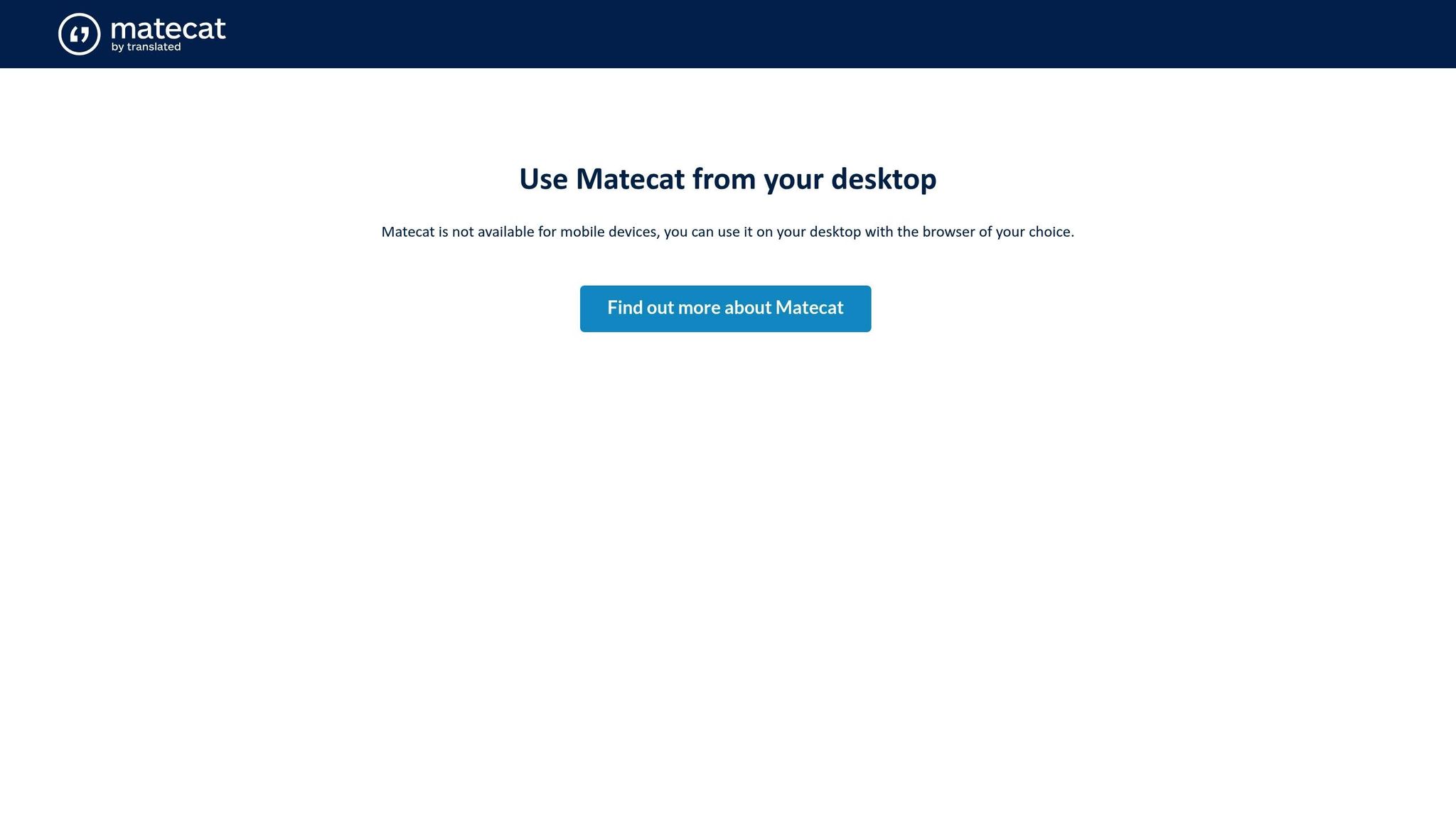
MateCat is a web-based, open-source Computer-Assisted Translation (CAT) tool often used by Reddit users for translating books. It combines machine translation with human editing, giving users greater control over their translation projects without the burden of high costs. Here's a closer look at what makes MateCat a standout choice in terms of accuracy, formatting, language support, and affordability.
Accuracy
MateCat leverages multiple machine translation engines alongside post-editing tools to ensure translations are consistent and maintain the original tone and character voice. The platform uses translation memory to learn from previous corrections, which helps keep the narrative flow uniform in lengthy texts. It also provides a quality estimation feature that assigns confidence scores to translations, making it easier to identify sections that might need closer human review. By combining these elements, MateCat ensures a balance of machine efficiency and human precision.
Formatting Retention
One of MateCat's strengths is its ability to manage a variety of file formats while keeping the original document structure intact. It works seamlessly with formats like DOCX, XLSX, XML, and HTML, preserving key elements like bold text, italics, and paragraph breaks. For book translation projects, this means chapter headings, footnotes, and basic formatting are usually retained. That said, documents with complex layouts or embedded images may still need some manual tweaking after the translation process.
Language Support
With support for over 100 language pairs, MateCat offers flexibility for a wide range of translation needs. The platform integrates with well-known machine translation engines, such as Google Translate and Microsoft Translator, allowing users to choose the one that best suits their project. It also includes an automatic language detection feature, which works well for many European languages. However, it can occasionally struggle with less common languages or documents containing multiple languages.
Pricing (USD)
MateCat is completely free to use, making it a cost-effective option for both individual translators and teams.
12. Wordfast
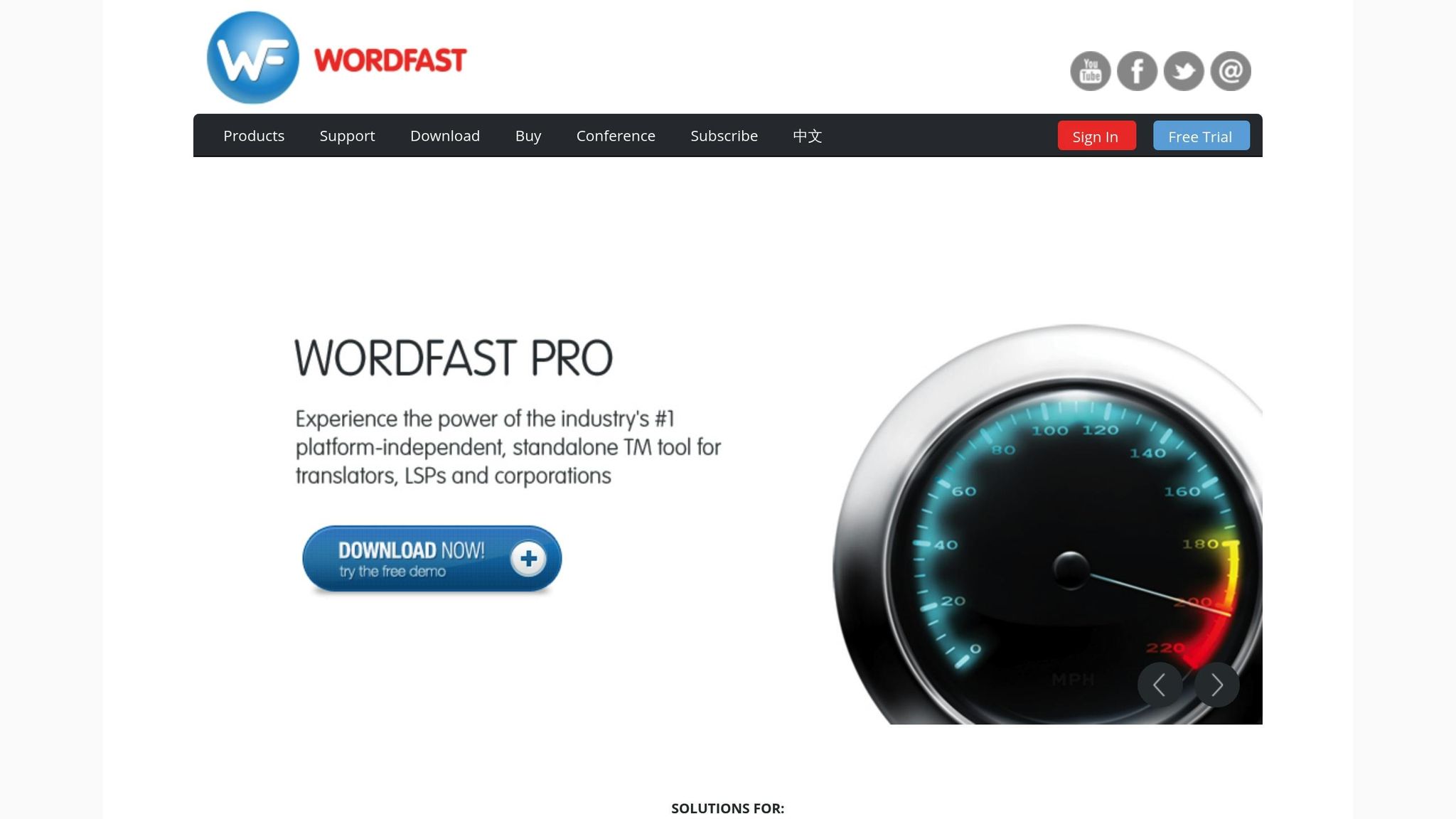
Wordfast is a Computer-Assisted Translation (CAT) tool that stands out for its strong translation memory capabilities and glossary integration. It’s designed to maintain consistency across large projects, like books, and is available in both cloud-based and desktop versions. Many users lean toward the desktop version for its extensive features.
Accuracy
Wordfast uses translation memories to deliver consistent, high-quality translations. With the ability to manage unlimited translation memories and glossaries, it ensures consistent character voice and narrative flow in long projects [17][19]. Its glossaries can hold over a million entries and include approximate terminology matching, which helps maintain consistency across different contexts [17][19].
For scenarios where translation memory matches are unavailable, Wordfast integrates multiple machine translation engines [17]. This hybrid approach blends the reliability of stored translations with the adaptability of machine-generated content, a method similar to other tools in the industry.
Formatting Retention
Maintaining formatting is critical for long texts, and Wordfast Pro excels in this area with its integration with Microsoft Word [17][19]. This ensures that key formatting elements - such as paragraph structures, basic text styles, and standard layouts - are preserved during the translation process, making it ideal for book manuscripts.
Language Support
Wordfast supports a wide range of languages, including Eastern European, Cyrillic, Asian, right-to-left languages like Arabic and Hebrew, as well as European and Hindi [17][19]. Wordfast Pro imposes no restrictions on language options, making it a versatile choice for multilingual projects [17]. Users can create multilingual translation packages that can be sent as a single file or split into separate packages depending on language pairs [17].
Additionally, the Wordfast Aligner tool offers professional-grade alignment for 36 languages [18]. However, the demo version of this tool is limited to bilingual projects [17].
13. MemoQ
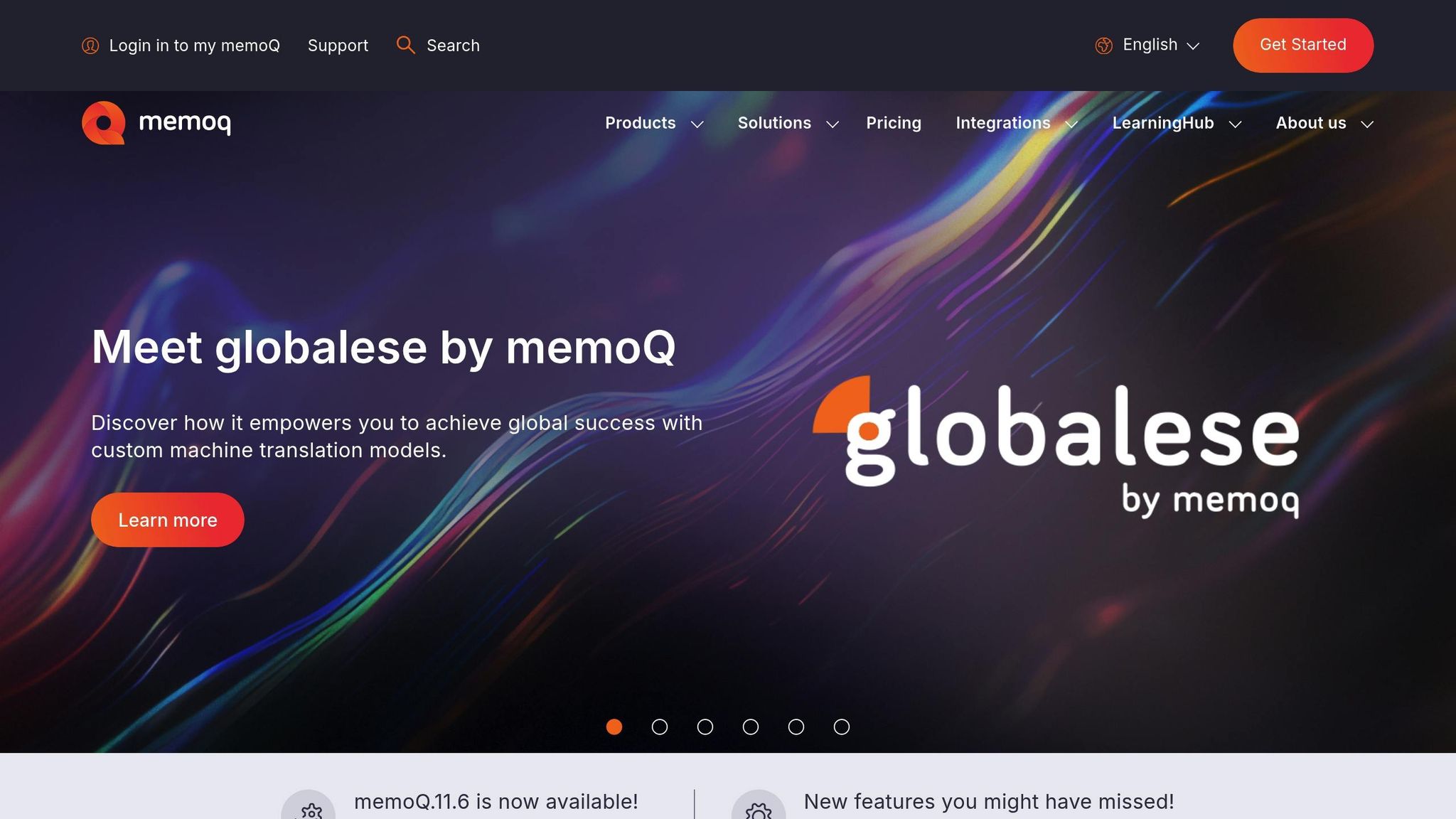
MemoQ is a desktop-based CAT tool designed to handle complex translation projects, making it a strong choice for large-scale book translations. It offers both individual translator licenses and tools tailored for enterprise-level project management, ensuring it meets the needs of both freelancers and organizations.
Accuracy
MemoQ stands out for its advanced translation memory and terminology management systems, which help maintain consistency throughout lengthy documents. By storing previously translated segments and suggesting matches for similar content, the tool ensures a uniform tone and style. Its LiveDocs feature allows translators to reference entire documents, which is especially useful for keeping an author's voice consistent across a book series.
The software integrates seamlessly with machine translation engines like Google Translate, Microsoft Translator, and Amazon Translate. This allows users to combine automated suggestions with their own expertise. Additionally, MemoQ's quality assurance tools automatically flag potential errors, inconsistencies, and formatting issues, ensuring high accuracy during the translation process. These features work hand-in-hand with MemoQ's ability to retain formatting, making it a reliable choice for book projects.
Formatting Retention
When translating books, preserving the original layout is critical, and MemoQ excels in this area. It supports a wide variety of publishing formats, including Microsoft Word, InDesign files, and various e-book formats. The software's preview function lets translators see how their work will appear in the final document, reducing the need for extensive post-translation adjustments.
MemoQ also includes a tag protection system, which safeguards formatting codes and special characters. This is particularly important for elements like chapter headings, footnotes, italicized text, and unique typography often found in books, ensuring these features remain intact throughout the translation process.
Language Support
With support for over 80 languages, MemoQ is equipped to handle even the most complex scripts, such as Arabic, Hebrew, Chinese, and Japanese, alongside European languages. Its bidirectional text support makes it ideal for translating between languages with different writing directions.
For Asian languages, MemoQ includes specialized features like character counting for Chinese, Japanese, and Korean texts. This functionality is crucial for accurate project estimation and billing, particularly in markets where character-based metrics are standard.
Pricing (USD)
MemoQ offers flexible pricing options to suit different needs. The translator pro version is available for a one-time fee of $620, while the project manager edition costs $1,860. Both options require an annual maintenance fee equal to 20% of the license cost.
For users who prefer a subscription model, MemoQ offers plans starting at $47 per month for the translator pro version. Additionally, students and academic institutions can benefit from educational discounts of up to 50%, making MemoQ more accessible for those learning translation or working on academic book projects.
14. Trados Studio
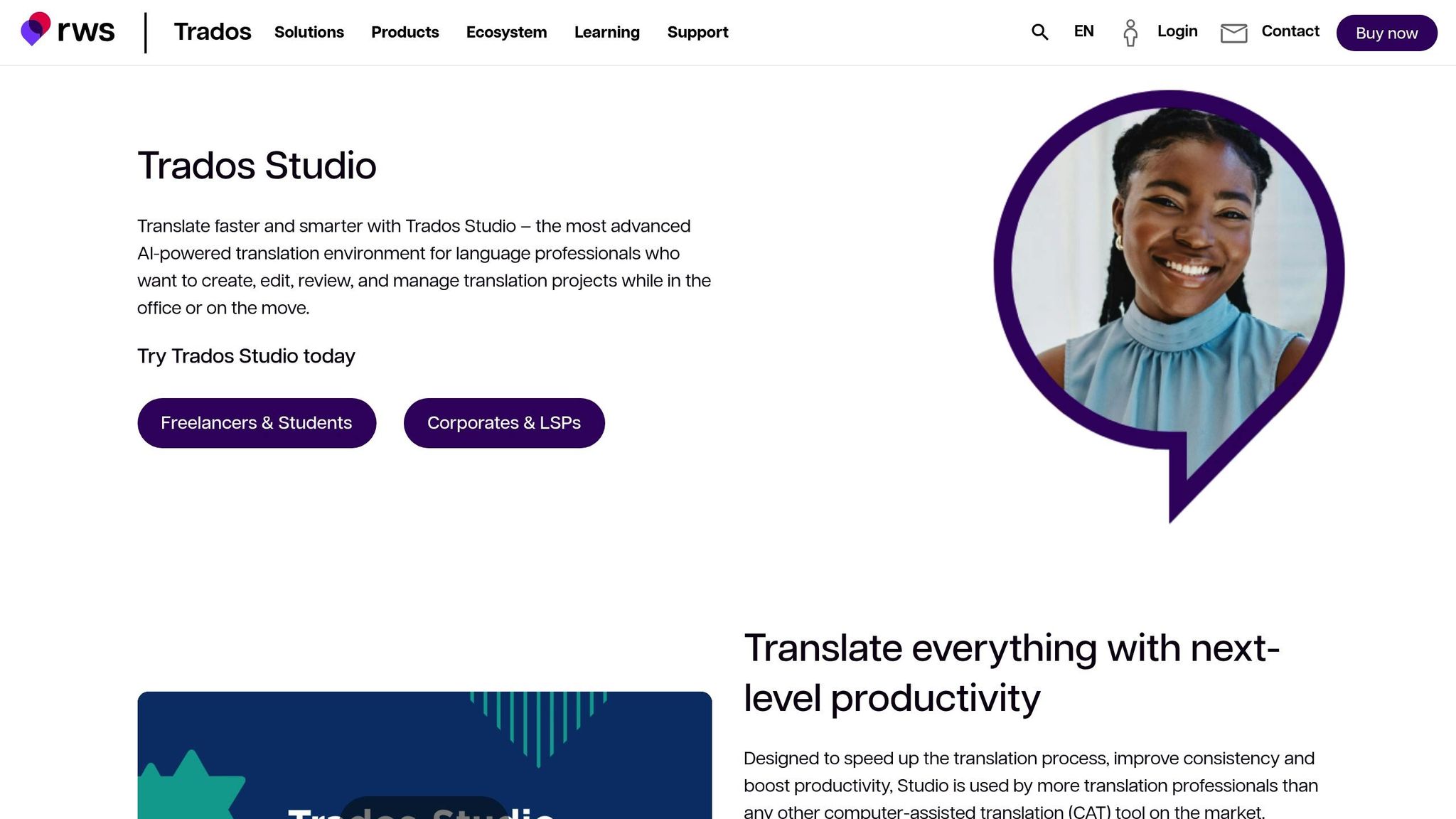
Trados Studio, developed by RWS, is a desktop-based computer-assisted translation (CAT) tool tailored for professional translators and agencies. It's particularly well-suited for translating full-length books, offering project management features that help maintain consistency throughout extensive manuscripts.
Accuracy
Trados Studio uses translation memory to ensure consistency across a manuscript. By storing previously translated segments, it helps retain uniformity in character names, technical terms, and recurring phrases. This feature is invaluable for preserving the narrative flow.
The tool also integrates machine translation that improves over time with user input, while built-in quality assurance checks identify inconsistencies, missing translations, and formatting errors. For more complex literary projects, the concordance search feature allows translators to reference past translations, helping maintain the author's unique voice and style. Additionally, its formatting retention ensures the translated text aligns with the original layout.
Formatting Retention
Formatting is critical in book translation, and Trados Studio stands out with its robust capabilities. It supports a wide range of publishing file formats, including Microsoft Word, Adobe InDesign, XML, and popular e-book formats like EPUB and MOBI.
Real-time previews allow translators to handle footnotes, headers, and layouts with precision. The integrated tag verification system ensures formatting codes and special characters remain intact. Plus, the ability to work across multiple formats simultaneously ensures consistency between print and digital versions.
Language Support
Trados Studio supports over 70 languages, including complex scripts like Arabic, Hebrew, Chinese, Japanese, and Korean. Its bidirectional text capabilities and support for right-to-left languages make it a strong choice for global book translation projects.
For Asian languages, the tool offers specific features like character counting, which is particularly useful for planning and budgeting. Combined with its extensive language support, these features make Trados Studio a versatile option for diverse translation needs.
Pricing
Trados Studio offers flexible pricing options. Freelancers and agencies can choose between a perpetual license or a subscription plan, with the latter including updates and cloud-based functionalities. Students and educational institutions can take advantage of significant discounts, making it an accessible choice for academic projects and training purposes.
15. Lokalise
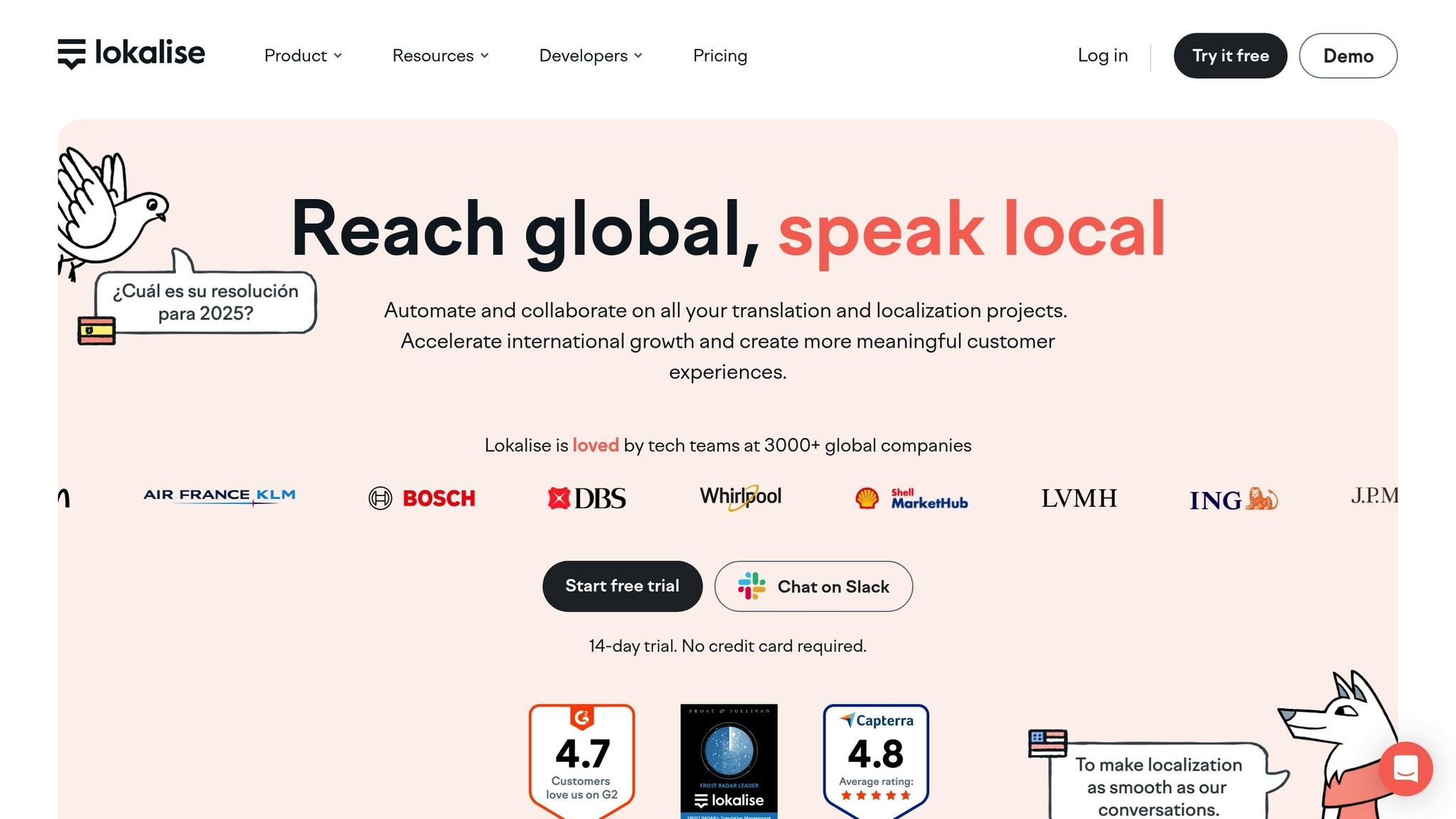
Lokalise is a platform designed to handle localization for software, mobile apps, and websites. Its primary focus is on managing UI/UX elements and code-based content, rather than translating entire books or literary works. While it excels at working with structured data and code files, it’s not built to handle the complexities of book formatting. Features like chapters, footnotes, headers, or detailed page layouts are not preserved, making it a poor fit for projects that demand intricate formatting or literary precision.
16. Lingvanex
Lingvanex is an AI-driven translation tool designed to handle both text and document translations. According to feedback from Reddit users, it performs reasonably well for translating full-length books but comes with its own set of challenges, especially for more complex projects.
Accuracy
The quality of translations with Lingvanex largely depends on the language pair and the type of content. For simple narrative text, it often delivers satisfactory results. However, when it comes to capturing the subtleties of literary language or maintaining consistent terminology in longer texts, users have pointed out noticeable shortcomings.
Formatting Retention
One area where Lingvanex struggles is retaining document formatting. Features like chapter headings and paragraph spacing might not come through as expected, meaning manual adjustments are often required after translation.
Language Support
Lingvanex supports a broad array of languages, but the quality of translations can vary significantly between language pairs. Some combinations produce better results than others, so it’s worth testing for your specific needs.
Pricing
The service operates on a tiered subscription model. While the lower-tier plans might be sufficient for smaller tasks, full-book translations often require upgrading to a higher-tier plan to access more robust features.
Lingvanex offers a mix of strengths and limitations, making it a tool worth considering - but careful assessment is key for large-scale projects like book translations.
17. Papago
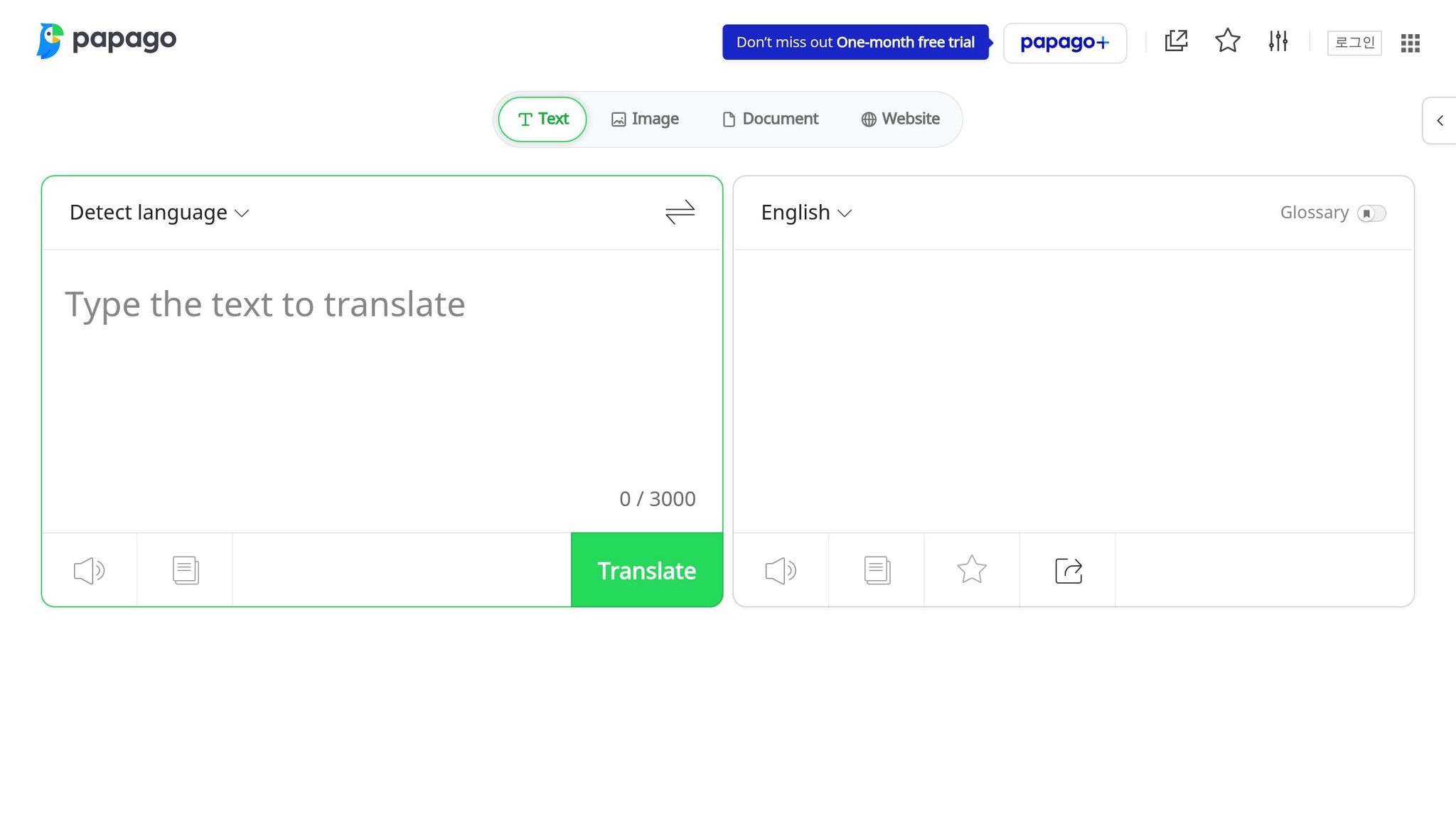
Papago, created by Naver, is an AI-powered translation tool that has gained attention on Reddit, particularly for its effectiveness with East Asian languages. While it’s not specifically built for translating full-length books, some users have experimented with it for literary translations, with mixed outcomes. Let’s dive into its accuracy, language capabilities, and pricing options.
Accuracy
Papago shines when handling translations between Korean, Japanese, Chinese, and English. It’s praised for grasping cultural nuances and idiomatic expressions, which helps maintain the flow of narratives. However, its performance can falter when dealing with European or less common language pairs, especially when faced with intricate literary elements like metaphors or wordplay.
Language Support
The platform’s strength lies in its focus on East Asian languages, making it a solid choice for translating works involving Korean, Japanese, or Chinese. That said, its range of supported languages is somewhat limited, which might be a drawback for projects requiring translations into less common or certain European languages.
Pricing
Papago operates on a freemium model. The free tier includes daily translation limits, which should suffice for casual use. For larger tasks, such as translating entire books, users may need to explore the paid API service. For the latest pricing details, visit Papago’s official website.
18. Reverso
Reverso stands out on Reddit for going beyond simple, word-for-word translations. While it started as a tool for dictionary and verb conjugation needs, it has evolved into a platform offering context-aware translations. Some users have even tested it for translating books, although it’s not specifically designed for full-length literary works. Its ability to handle nuanced expressions makes it a favorite for dealing with complex, context-heavy text.
Accuracy
One of Reverso’s most praised features is its Context tool, which provides real-world examples of how words and phrases are used in various scenarios. This feature is particularly helpful for translating idiomatic expressions and colloquialisms accurately. Reverso performs exceptionally well with romance languages like French, Spanish, and Italian, maintaining both grammatical precision and contextual understanding.
That said, it’s not without limitations. Reddit users have pointed out that Reverso struggles with longer passages and intricate literary devices. It works best with shorter text chunks - typically between 500 and 1,000 words. For larger projects, like book translations, users would need to break the text into smaller sections, which can make the process more time-consuming.
Language Support
Reverso supports 14 major languages, including English, French, Spanish, German, Italian, Portuguese, Russian, Arabic, Hebrew, Japanese, Korean, Dutch, Polish, and Romanian. While this is fewer than some competitors, the platform shines in European language pairs, offering higher-quality translations. For example, French-English and Spanish-English translations are often highlighted for their accuracy, even in literary contexts.
However, its performance is less consistent with Asian languages like Japanese and Korean, especially when dealing with complex literary texts. This makes it a better choice for European language pairs than for translations involving Asian languages.
Pricing
Reverso uses a freemium model, making it accessible for both casual and more intensive users. The free version provides unlimited access to basic translation features and context examples, which is often sufficient for everyday needs. For those requiring advanced features, such as document translation and higher usage limits, Reverso Premium is available at $9.99 per month or $59.99 annually.
Premium users benefit from features like unlimited document translation, an ad-free experience, and priority customer support. If you’re tackling a book translation, the free version might work if you're okay with handling smaller text segments. However, upgrading to premium can save time and streamline the process for larger projects.
Strengths and Weaknesses Comparison
BookTranslator.ai has gained recognition as a dependable tool for translating entire books, particularly EPUB files. Its design focuses on preserving the original meaning, style, and layout through a straightforward one-click process. Here's a quick breakdown of its main features and pricing:
| Tool | Key Strengths | Main Weaknesses | Language Support | Pricing (USD) |
|---|---|---|---|---|
| BookTranslator.ai | One-click EPUB translation; preserves formatting; supports 99+ languages | Limited to EPUB format only | 99+ languages | $5.99–$9.99 per 100,000 words |
BookTranslator.ai stands out for its ability to maintain the narrative tone and stylistic details, ensuring the author's voice remains intact. It also automatically handles chapter breaks, paragraph spacing, and text styling, which significantly reduces the need for post-translation edits.
The tool's pricing model, ranging from $5.99 to $9.99 per 100,000 words, makes it a cost-effective option for comprehensive book translations. While longer texts may experience slower processing times, the tool's optimization ensures post-editing is kept to a minimum, making it a practical choice for full-book translation projects.
Final Recommendations
Based on extensive user feedback, the best AI translation tool for your project depends on the scale and level of precision you need. After reviewing Reddit users' experiences with 18 different AI translation tools, it’s clear that your priorities - whether they’re accuracy, cost, or language versatility - will guide your decision for book translation projects.
For full-book translations, especially EPUB files, BookTranslator.ai takes the lead. It simplifies the process with one-click functionality, delivers strong contextual accuracy, and supports a wide range of languages. Unlike general-purpose tools that often require heavy editing, it’s designed specifically for book translations, making it a standout choice.
If you’re on a budget, free options like Google Translate or DeepL can work for shorter excerpts or initial drafts. However, be prepared to invest significant time in post-editing to ensure quality.
For professionals and agencies, tools like Trados Studio or MemoQ are ideal for handling complex file formats. While they offer powerful features, they come with higher costs and steeper learning curves, which may be more suitable for experienced users.
When it comes to language-specific strengths, Papago excels with Korean translations, while DeepL is highly effective for European languages. That said, BookTranslator.ai stands out for its support of over 99 languages, offering unmatched flexibility for diverse translation needs.
One major insight from Reddit users is the importance of format preservation and contextual accuracy in book translations. Generic tools often struggle with maintaining chapter breaks, styling, and the narrative flow that readers expect in professionally published works.
For most book translation projects, BookTranslator.ai strikes the right balance of accuracy, proper formatting, and affordability, making it a top pick for both casual and professional users.
FAQs
How does BookTranslator.ai deliver accurate and consistent translations for full-length books?
BookTranslator.ai leverages cutting-edge AI to deliver translations that stay true to the original text. By analyzing the structure of the content, it preserves the style, tone, and formatting seamlessly during the translation process.
To ensure dependable results, the platform integrates automated quality checks at every step. It also uses a multi-pass, self-correcting system tailored specifically for long-form content, guaranteeing that translations remain accurate and consistent throughout the entire book.
What are the main benefits of using BookTranslator.ai for translating full-length books compared to traditional human translators?
BookTranslator.ai brings several benefits that set it apart from traditional human translation services. One of its biggest perks is speed - it can translate entire books in just a matter of minutes, which is perfect for meeting tight deadlines. On top of that, it’s incredibly affordable, with prices ranging from just $5.99 to $9.99 per 100,000 words. This makes it a great option for authors and publishers working within a budget.
Another standout feature is its ability to maintain the original layout and formatting of your book, so the final product looks polished and professional. Plus, with support for a wide range of languages, it’s easy to release your work in multiple languages quickly, opening doors to global markets with minimal hassle. These features make BookTranslator.ai an excellent choice for today’s book translation needs.
Can BookTranslator.ai accurately translate books while preserving their style and formatting?
BookTranslator.ai leverages cutting-edge AI technology to tackle the challenges of literary translation. With its AI Literary Analysis Engine and Multi-Pass Refinement System, it carefully navigates the subtleties of tone, style, and formatting, ensuring these elements are faithfully preserved.
This makes it an excellent option for translating full-length books, especially those with intricate storytelling or complex structures, while staying true to the essence of the original work.